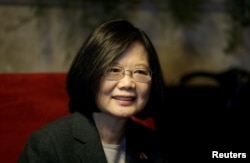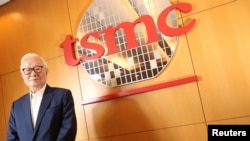Taiwan’s pick of a semiconductor magnate rather than a political figure as its envoy to a meeting of 21 Asian nations, including historical rival China, gives it a chance to showcase its tech prowess instead of its sticky position in geopolitics.
Morris Chang, retired chairman of Taiwan Semiconductor Manufacturing Co., will head the Taiwan delegation to the Asia-Pacific Economic Cooperation leaders’ summit next month in Papua New Guinea.
Taiwanese officials normally send political figures to the event that Chinese President Xi Jinping is also expected to attend. China sees self-ruled Taiwan as a breakaway part of its territory rather than as a country, keeping relations chilled for decades.
Taiwan President Tsai Ing-wen said she picked Chang because of his status in global industry. He’s ideal to discuss Taiwan’s technology with world leaders, she said Oct. 3 in announcing the appointment. Chang is expected to focus away from geopolitics or China-Taiwan ties.
“He qualifies as the best person to choose, because after all, these so-called (Taiwan) politicians, their level of international influence isn’t high enough,” said Liang Kuo-yuan, president of the think tank Polaris Research Institute in Taipei. “I believe that Morris will help speak for Taiwan at an appropriate time.”
Message of high-tech prowess
Taiwan has been a manufacturing hub since the 1980s for hardware such as PCs and, more recently, smartphones. Taiwanese firms often make those devices on contract for Apple and other major brands. Much of that hardware carries chips made by Taiwan Semiconductor Manufacturing Co.
Now Taiwanese leaders hope to shift their technology sector, about one-fifth of GDP, more toward software, such as mobile apps, and software-hardware combinations, in line with world trends. The central government is pushing the industry to rely more on own-brand gear instead of contract work.
Tsai asked Chang’s delegation at APEC to “identify opportunities for cooperation and tell the international community about Taiwan’s strengths, and vision and ideas about embracing our digital future,” the presidential website says.
Chang’s company is well known offshore, Liang said. He founded Taiwan Semiconductor Manufacturing Co. (TSMC) in 1987 and built it into the world’s largest contract chipmaker for electronic devices. He created the company after Taiwan officials at the time called him over from Texas Instruments in the United States to help jumpstart the island’s tech sector.
His New York-listed company that reported 2017 profits of $11.1 billion on $31.6 billion in revenue is seen as a bellwether for global tech investments. Chang, 87, retired in June.
Other world leaders “can understand TSMC’s strength,” enabling Chang to talk to them about management, Liang said.
China won’t mind
Chang as a skillful communicator from a nonpolitical background is unlikely to ruffle China at APEC, political scholars say. Taiwan’s delegates sometimes meet briefly with those from China, though they don’t use the event to discuss their own issues.
China forbids Taiwan’s participation outright in other international bodies, such as the United Nations, because it does not recognize the government in Taipei. It also asks that its 170-plus foreign allies avoid Taiwan except for trade and consular matters.
Taiwanese presidents have stayed in APEC to date by sending politicians, often from outside government, whom Beijing likes. Taiwan presidents themselves cannot attend the leader summits.
China and Taiwan have not talked formally since Tsai took office in 2016. Tsai disputes Beijing’s dialogue premise, that each side see itself as part of China.
“In terms of political reality, he’s the one and only (who) could be accepted on the part of mainland China, so that’s why Chang was sent out one more time,” said Liu Yih-jiun, professor of public affairs at Fo Guang University in Taiwan.
China-Taiwan relations off limits
Chang probably has no mandate to discuss China-Taiwan relations, known as cross-Strait ties, said Raymond Wu, managing director of Taipei-based political risk consultancy e-telligence.
“I don’t really expect anything substantive to come out of the APEC,” Wu said. “Whether Chang gets a meeting with Xi Jinping, it doesn’t really matter. That’s one of the no-no’s for Beijing — not to publicize cross-Strait relations internationally.”
Taiwan and China have been separately ruled since the Chinese civil war of the 1940s, when the Chiang Kai-shek’s Nationalists lost and fled to the island. Government opinion polls in Taiwan show most people support the island’s autonomy over China’s goal of unifying the two sides.






